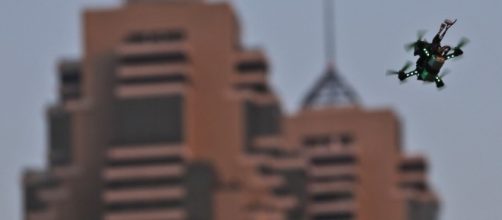Three times last year, Dubai International Airport was forced to close down due to recreational UAVs that could collide with large commercial aircraft. Temporary closures of the airport's airspace, one of the three most active in the world, have had serious consequences: several million dollars in losses and a cascade of aircraft diversions and delays. But "the economic impact is not taken into account" when it comes to passenger safety, says Ismail Al Blooshi, deputy director general in charge of security at the Aviation Authority of the United Arab Emirates to a source.
Disruptions cost Emirates millions of dirhams:
It was therefore considered that three times in 2016, the presence of drones near the airport represented "a threat to people in flight", he said. The closure of airspace has sparked the anger of airlines operating in Dubai, including the giant Emirates, who have asked the authorities to introduce detectors "fighter" drones. "Disruptions related to unauthorized flights of drones cost Emirates millions of dirhams each time and affect thousands of passengers," the company regretted after a new incident in November.
The authorities have not made any arrests but have since hardened the conditions of use of drones, extremely popular in the Emirates. Their users are now facing up to three years' imprisonment or a fine of 100,000 dirhams (25,000 euros) if they stole their machines within five kilometers of any airport.
The police in Dubai have the ability to neutralize a drone, said a security official to a source, without giving any details on these means.
On Monday, a private company took advantage of the IDEX weapons show in Abu Dhabi to present a "fighter" system of drones. Dubai-based SkyStream said it had designed a three-phase system capable of identifying the drone, blurring its signal and possibly destroying it if it were considered "hostile".
Red areas
Like the Emirates, many countries are trying to adapt to the explosion of the drones market. "In general, regulations for remotely piloted airplane systems (RPAS) are progressing," says William Raillant-Clark of the International Civil Aviation Organization (Icao).
In the European Union, the number of incidents "has increased in recent years", says Yves Morier, of the agency in charge of air safety (Easa). The latter has legislated on drones weighing more than 150 kg which represents the greatest threat to aviation safety.
France is among the most advanced countries and has prohibited the use of drones within a radius of ten kilometers around airports. In Dubai, the Aviation Authority has also introduced an application for mobile phones that clearly indicates aerial prohibition zones for drones across the country. The red areas are quite large and include airports, military areas, and other strategic facilities.
It is also envisaged to include a geo repayment system that automatically prevents the drone from overflying prohibited areas. "We are talking with different manufacturers to impose this as an import requirement in the Emirates," Blooshi said.

